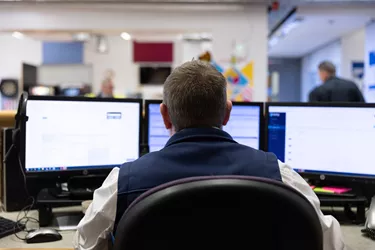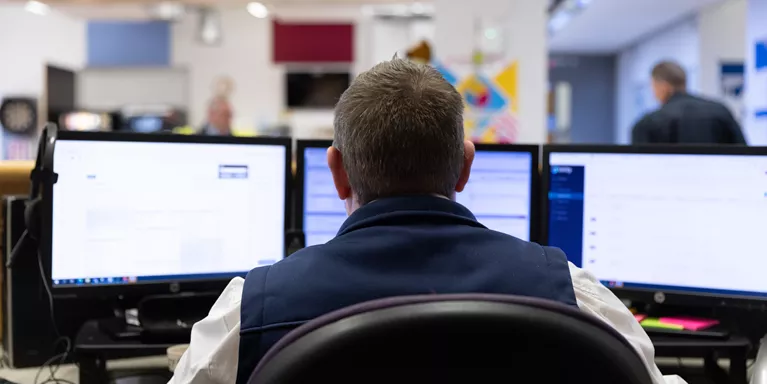On the other side of the Mind Infoline
If you contact the Mind Infoline, you might find yourself talking to Graham. Here he tells us about his work and what it is like being on the other end of the line.
I really believe that what we do at the Mind Infoline makes a big difference. We are all passionate about what we do and are committed to providing the best support we can.
My career has been spent working on projects with young people and while it wasn’t a direct mental health role, many of the groups and families I worked with were living with mental health issues.
I wanted to contribute and felt my communications skills would be helpful. I feel as if I have always been able to engage with people. And besides, I’d make a rubbish bricklayer or car mechanic!
There is no average day, it varies enormously and obviously some calls can be difficult.
"I always try to remember that someone has plucked up the courage to contact us in the first place – by email, phone, text or webchat – so there is something important that they want to say."
It is important that when they hear your voice, they feel confident enough to take the next step.
Even if it’s a concerned family member calling, they may feel anxious, stressed, depressed or scared and it’s my job to connect with that person.
We always try to make every caller feel welcomed and reassured. We might need to prompt them a little bit if they are feeling nervous but also recognise when they need a bit of time and space to say what they need to. Sometimes they have been wanting to speak to someone for so long that lots of different things are blurted out. And that’s fine but we might just have to go back to unpick and unravel things a little.
"While we show empathy, we are not counsellors and the Infoline isn’t a counselling service. We’re not doctors or pharmacists either so we can’t advise people on medication. We just make sure that people are directed to the right places for practical information and support."
We often steer people towards the local Minds that offer many services such as counselling, drop-in centres and courses. We often provide very specific information. If someone feels they would benefit from being outside more, we can signpost them to gardening or conservation projects for example. The enquiries are extremely diverse.
We get calls from people who are really struggling as well as many calls from worried family and friends. We even get neighbours ringing in.
By February, we had already received more than 100,000 calls in 2019. Mental health is definitely becoming more prominent. It’s being talked about – which is brilliant – by the Royals, celebrities and employers. If a piece about mental health is on TV that morning, we know that we will get a high volume of calls, emails, web chatter and so on.
"It’s very positive that mental health is now being openly talked about as attitudes and stigmas are starting to change."
Fortunately, as employees, we also get lots of support - sometimes you get difficult calls. When we do we can chat to our team leaders and take time out if we need it, because we need to be strong and confident in order to be effective with the next caller.
I love the work because it is so varied and I am able to engage with people. We can make such a big difference to someone’s life and that’s why I am here, doing what I do.


Information and support
When you’re living with a mental health problem, or supporting someone who is, having access to the right information - about a condition, treatment options, or practical issues - is vital. Visit our information pages to find out more.
Share your story with others
Blogs and stories can show that people with mental health problems are cared about, understood and listened to. We can use it to challenge the status quo and change attitudes.

















